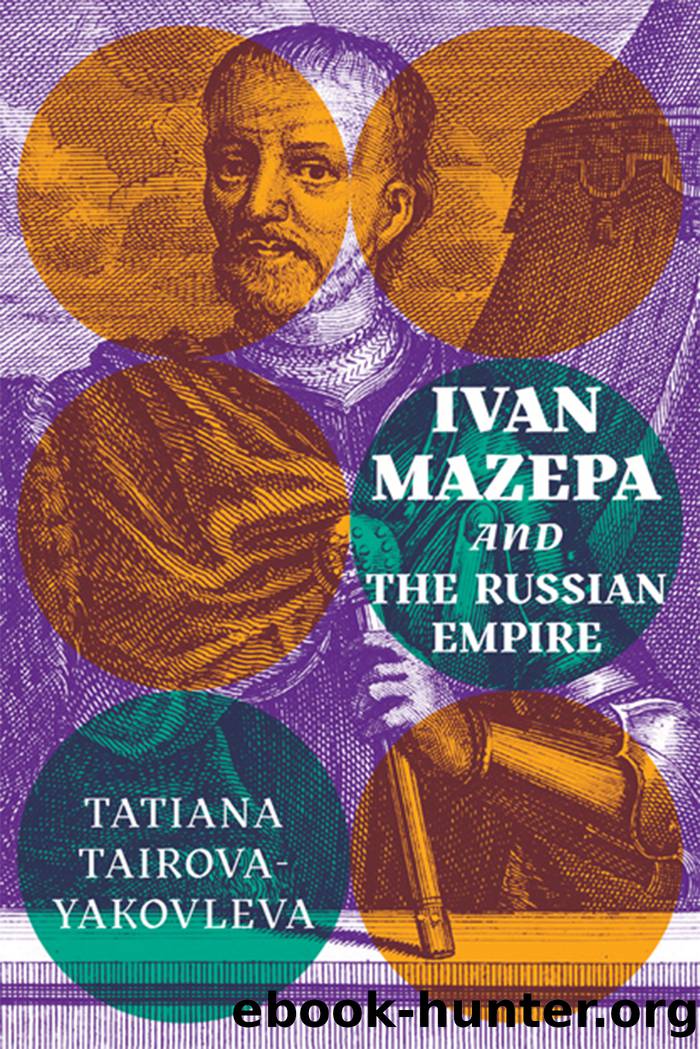Ivan Mazepa and the Russian Empire by Tairova-Yakovleva Tatiana;

Author:Tairova-Yakovleva, Tatiana;
Language: eng
Format: epub
Publisher: McGill-Queen's University Press
Published: 2020-08-15T00:00:00+00:00
8
Mazepa and the âBirds of Peterâs Nestâ1
This chapter discusses Mazepaâs personal and business relations with many Russian political figures of the Petrine era. On this topic, too, many clichés exist, behind which the essence is often lost. This applies, for example, to the hackneyed thesis concerning the hostility between Mazepa and Aleksandr Menshikov, though there is no doubt there was hostility.
But the list of true companions and even friends of Mazepa among the first-rank dignitaries of the nascent empire was much longer than that of his enemies. This is important for understanding and assessing the activities of Mazepa the hetman during his long reign. The facts persistently show that throughout the years of his rule he firmly linked his own future and the future of his native land to Peterâs reforms. In his difficult work he relied on close contacts with leading political and military figures of Peterâs era. These longtime contacts often outgrew the bounds of business and became personal.
Materials from the Baturyn archive, as well as materials from RGADA and some other sources, give a good sense of the nature and scope of Mazepaâs cooperation with the Russian nobility. Mazepa corresponded with almost all the leading political figures of Russia: Tikhon Streshnev, Mikhail Cherkasskii, Ivan Troekurov, Lev Naryshkin, Iakov Dolgorukov, Dmitrii Golitsyn, Ivan Golovin, Nikita Zotov, Petr Shafirov, Iakov Brius, Ivan Kol'tsov-Masal'skii, Emel'ian Ukraintsev, Andrei Vinius, Petr Tolsto, Aleksei Kurbatov, Sava Raguzinskii, Karion Istomin, dÎiaks Boris Mikhailov and Vasilii Postnikov, Aleksandr Kikin, V. P. Stepanov, D. Kovnev, Mikhail Rtishchev. These documents irrefutably negate both the thesis of âelemental treasonâ and the theory that the hetman from the first years of his rule had been planning an uprising against Moscow.
One should not oversimplify the situation, however. Passionate intrigues always burned among those close to the tsar. People competed desperately for power and wealth, as well as for influence over the foremost person in the state. Envy and rivalry prevailed, too, among the âbirds of Peterâs nest,â that is, the close circle of the court. Yet Mazepa maintained very friendly relations with members of hostile factions for many years. He followed the Russian tradition of âgifts.â For example, he sent wine to the conciliar secretary Emel'ian Ukraintsev, to the secretaries of the Foreign Office, and to the under-secretary of the Little Russian Office.2 Examples are numerous, and will be described in more detail below.
Mazepaâs political agility helped him maintain friendly relations with many Russian politicians, as did the detached position he occupied as the leader of an autonomous entity. Mazepa almost never participated in Peterâs entertainments, perhaps for reasons of piety (the âAll-Joking, All-Drunken Sobor [Synod]â had to have shocked him), perhaps owing to his frequent illnesses. This can hardly be explained by the age difference, for, as is well-known, Peterâs âseniorâ dignitaries and Mazepaâs peers were forced to become drunks and play the jester in order to please the tsar. In any event, the hetman kept his distance. Peter called Mazepa âLord Hetman,â while Mazepa addressed the tsar solely
Download
This site does not store any files on its server. We only index and link to content provided by other sites. Please contact the content providers to delete copyright contents if any and email us, we'll remove relevant links or contents immediately.
The Vikings: Conquering England, France, and Ireland by Wernick Robert(79220)
Ali Pasha, Lion of Ioannina by Eugenia Russell & Eugenia Russell(39938)
The Vikings: Discoverers of a New World by Wernick Robert(36830)
The Conquerors (The Winning of America Series Book 3) by Eckert Allan W(36715)
Cecilia; Or, Memoirs of an Heiress — Volume 1 by Fanny Burney(32091)
Cecilia; Or, Memoirs of an Heiress — Volume 3 by Fanny Burney(31481)
Cecilia; Or, Memoirs of an Heiress — Volume 2 by Fanny Burney(31435)
Empire of the Sikhs by Patwant Singh(22779)
Hans Sturm: A Soldier's Odyssey on the Eastern Front by Gordon Williamson(18341)
The Secret History by Donna Tartt(18266)
Cat's cradle by Kurt Vonnegut(14804)
Sapiens: A Brief History of Humankind by Yuval Noah Harari(14006)
Pimp by Iceberg Slim(13828)
Talking to Strangers by Malcolm Gladwell(12915)
Norse Mythology by Gaiman Neil(12878)
Leonardo da Vinci by Walter Isaacson(12832)
Underground: A Human History of the Worlds Beneath Our Feet by Will Hunt(11857)
4 3 2 1: A Novel by Paul Auster(11842)
The Radium Girls by Kate Moore(11651)
